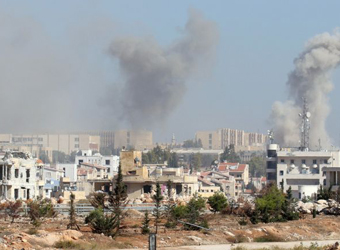Shelling killed three people in the last major rebel stronghold near Damascus on Tuesday shortly before the UN Syria envoy said the government had agreed a ceasefire there.
Russia had on Monday proposed a ceasefire in the besieged Eastern Ghouta area on Nov. 28-29. U.N. Syria envoy Staffan De Mistura later said Russia had told him that the Syrian government had accepted the idea, but he added “we have to see if it happens”.
The Syrian Observatory for Human Rights, the war monitor, said there were three deaths and 15 injuries from Tuesday’s shelling, but that it was less intense than in previous days. A witness in the area said that while the shelling was lighter earlier in the day, it had intensified later.
A Syrian official said the situation on Tuesday was calm.
The UN’s humanitarian agency OCHA said in a Tweet that relief teams had entered Eastern Ghouta with food and health supplies for 7,200 people, entering through Nashabiyeh on the opposite side of the pocket from where the fighting was.
Over the weekend, government air strikes and shelling on Ghouta intensified, killing at least 43 people on Sunday and Monday, the Observatory said. Syrian state media said 13 shells hit government-held areas of Damascus on Monday.
Eastern Ghouta is one of several “de-escalation” zones across western Syria where Russia has brokered ceasefire deals between rebels and President Bashar al-Assad’s government. But fighting has continued there.
U.N.-backed peace talks in Geneva are set to begin on Tuesday. The government delegation will arrive on Wednesday to attend the talks, state news agency SANA reported.
The opposition delegation, the Syrian Negotiation Commission, called for direct negotiations with the government instead of the previous model of each side speaking only to UN mediators.
Médecins Sans Frontières, the international medical humanitarian organization, said on Monday hundreds of people had been wounded in intense bombing and shelling of the Eastern Ghouta in the last two weeks.
It said five MSF-supported field hospitals in East Ghouta had treated 576 wounded patients and recorded 69 deaths, with a quarter of the wounded women or children under the age of 15.
In a statement, MSF said its figures did not account for the total numbers killed in the area as there are other medical facilities it does not support regularly.
Reporting by Lisa Barrington and Tom Perry in Beirut and Tom Miles in Geneva; Editing by Raissa Kasolowsky and Richard Balmforth.
Source: Reuters
